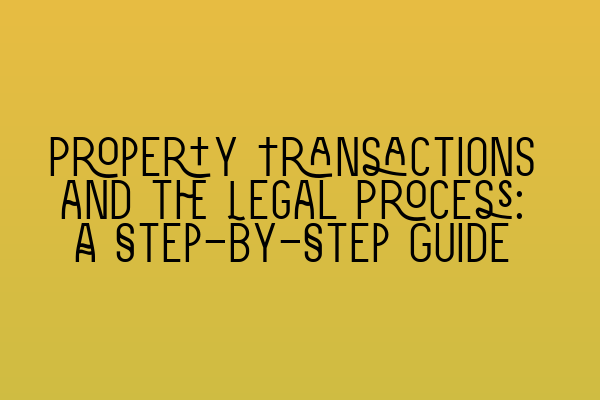Property Transactions and the Legal Process: A Step-by-Step Guide
When it comes to property transactions, whether you are buying or selling a property, it is important to understand the legal process involved. Making sure that you have a good understanding of the steps involved can help ensure a smooth and successful transaction. In this comprehensive guide, we will take you through the step-by-step process of property transactions, from start to finish.
Step 1: Preparing for the Transaction
Before you embark on a property transaction, it is essential to be prepared. This involves conducting thorough research and understanding the market conditions. It is advisable to seek professional advice from a solicitor who specializes in property law, such as the expert solicitors at SQE Property Law & Land Law.
Additionally, it is important to have your finances in order. If you plan to buy a property, you will need to secure a mortgage or have the necessary funds available. If you are selling a property, make sure you have all the required documentation ready, such as the title deeds and energy performance certificate.
Step 2: Instructing a Solicitor
The next step in the property transaction process is to instruct a solicitor. A solicitor will act on your behalf and handle all the legal aspects of the transaction. They will ensure that all necessary checks and searches are carried out, and that the transaction meets all legal requirements.
At SQE Property Law & Land Law, our team of expert solicitors are experienced in handling property transactions. They will guide you through the process, offering professional advice and support every step of the way.
Step 3: Property Searches and Checks
As part of the legal process, various searches and checks need to be carried out to ensure that the property is suitable for purchase. These may include:
- Local authority searches: This search provides information about planning permissions, conservation areas, and any other issues that may affect the property.
- Environmental searches: These searches determine if the property is at risk from potential environmental hazards, such as flooding or contamination.
- Land registry searches: These searches confirm the legal owner of the property and provide details of any mortgages or charges against the property.
It is important to note that the specific searches and checks required may vary depending on the location and type of property. Your solicitor will advise you on which searches are necessary for your particular transaction.
Step 4: Negotiating and Agreeing on Terms
Once the necessary searches have been completed, the next step is to negotiate and agree on the terms of the property transaction. This includes the purchase/sale price, any conditions or contingencies, and the desired completion date.
During this stage, it’s important to have a clear understanding of property law and the legal implications of the terms being agreed upon. Having a solicitor from SQE Property Law & Land Law by your side will ensure that your best interests are protected and that the transaction is fair and legally binding.
Step 5: Exchange of Contracts
After the terms have been agreed upon, the next step is the exchange of contracts. This is a legally binding stage of the property transaction and signifies the commitment from both parties to proceed with the transaction.
During the exchange of contracts, the buyer will pay a deposit (typically around 10% of the purchase price), and a completion date will be set. Once the contracts are exchanged, neither party can back out without facing financial penalties.
Step 6: Completion and Finalizing the Transaction
The final step in a property transaction is the completion. This is when the remaining balance is transferred, and the property officially changes ownership. The completion date is agreed upon during the exchange of contracts stage.
On the day of completion, the buyer’s solicitor will transfer the funds to the seller’s solicitor, and all necessary documentation will be exchanged. The buyer will receive the keys to the property, and the seller will receive the remaining balance after deducting any outstanding fees.
It is important to note that even after completion, there are still some post-completion formalities that need to be completed, such as registering the property with the Land Registry and notifying the relevant authorities of the change in ownership.
Conclusion
Property transactions can be complex, but having a good understanding of the legal process involved can help ensure a smooth and successful transaction. By following this step-by-step guide and seeking professional advice from SQE Property Law & Land Law, you can navigate the property transaction process with confidence.
For more information about property law, preparation for the SQE exams, or to find out about our range of preparation courses, visit our related articles below:
